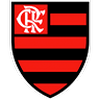Flamengo
Brazil
Série A
Est: 1895
Clube de Regatas do Flamengo (Brazilian Portuguese: [ˈklubi dʒi ʁeˈɡataz du flaˈmẽɡu]; lit. 'Flamengo Rowing Club'), more commonly referred to as simply Flamengo, is a Brazilian multi-sports club based in Rio de Janeiro, in the neighborhood of Gávea. It was founded and named after the Flamengo neighborhood in 1895 and is best known for its professional football team. Flamengo is one of two clubs to have never been relegated from the top division, along with São Paulo FC, and the most popular football club in Brazil with more than 46.9 million fans, equivalent to 21.9% of the population that supports a team in Brazil.
The club was first established in 1895 specifically as a rowing club in the Flamengo neighborhood and did not play its first official football match until 1912. Flamengo's traditional uniform features red and black striped shirts with white shorts, and red and black striped socks. Flamengo has typically played its home matches in the Maracanã Stadium (which also often host the Brazil national team) since its completion in 1950. Since 1969, the vulture (Portuguese: urubu) has been the mascot of Flamengo.
Flamengo is Brazil's richest and most valuable football club with an annual revenue of R$1.2 billion (€218 million) and a valuation of over R$3.8 billion (€691 million). Flamengo is the non-European football club with the most followers on social media, with 49 million followers across all platforms as of 18 June 2023, and also the most successful Brazilian team of the 21st century so far.
The clubs's training center, officially known as \"Ninho do Urubu\" (\"Vulture's Nest\"), is located in Vargem Grande, Rio de Janeiro. It serves as the primary training facility for the Flamengo football club, housing its professional teams and youth academy. Flamengo's youth academy is one of the most prolific in Brazil and in the world, having developed a number of Brazilian internationals such as Zico, Zizinho, Vinícius Júnior, Lucas Paquetá, Júlio César, Adriano, Mário Zagallo, Júnior and Leonardo.
Flamengo has also been well represented in the Brazil national team; at the 1938 FIFA World Cup, forward Leônidas da Silva, a Flamengo player at the time, was the Golden Boot winner with 7 goals and won the Golden Ball, thus becoming the first Brazilian player ever to win those two awards. Twelve years later at the 1950 World Cup, Zizinho, a midfielder for Flamengo, also won the Golden Ball after he was voted best player; 4 out of the 10 top scorers for Brazil have all been Flamengo players at one point in their careers, seven players have won the World Cup whilst playing for Flamengo, and Flamengo player Mário Zagallo scored Brazil's third goal in the 1958 World Cup final.
▤ Read more 
 Premier League
Premier League La Liga
La Liga Bundesliga
Bundesliga Serie A
Serie A Ligue 1
Ligue 1 Liga Portugal
Liga Portugal Eredivisie
Eredivisie Süper Lig
Süper Lig MLS
MLS Série A
Série A J1 League
J1 League Saudi Pro League
Saudi Pro League WSL
WSL Première Ligue
Première Ligue NWSL
NWSL






 YouTube
YouTube





























 •Youtube
•Youtube







